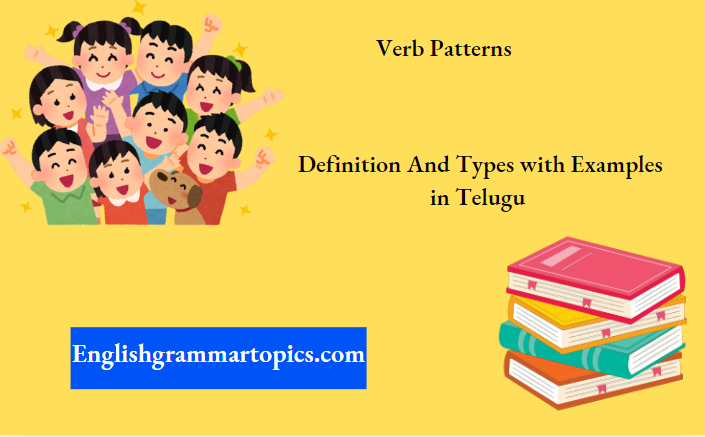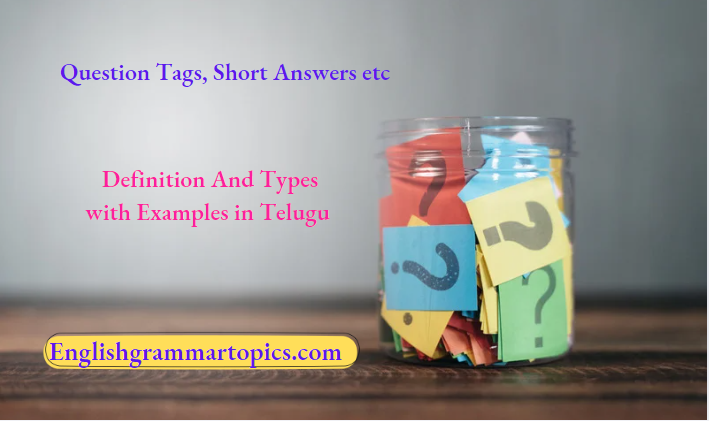అధ్యాయము 32
More Structures
1) Preparatory వాక్యమును ప్రారంభించు పదము Jane S: There + be + subject
| There + be | Subject, etc. | |
| 1 | There is | a book on the desk. |
| 2 | There is | a hotel near the station. |
| 3 | There is | a lamp beside the bed. |
| 4 | There was | someone at the door. |
| 5 | There are | twelve months in a year. |
| 6 | There are | plenty of pins in a drawer. |
Subject పదము యిదమిద్దమని భావమును గాని, గుర్తింపును గాని మనకు ఇవ్వనపుడు ‘There + be’ అను structure ను సాధారణంగా ఉపయోగించెదము. ఈ సందర్భములో subject కు ముందు
భాగములో a గాని, an గాని, some గాని, much గాని, many గాని, a few గాని ఉండును.

2) adjective తరువాత to-infinitive ను వాడినట్లయితే ఉద్వేగమును గాని, ఒక కోరికను గాని తెలియజేయును.
| Subject + verb | Adjective | to-infinitive etc. | |
| 1 | We were | glad | to see him. |
| 2 | She is | afraid | to go alone. |
| 3 | My brother is | eager | to join the army. |
| 4 | I shall be | happy | to accept your invitation. |
| 5 | He was | anxious | to meet you. |
| 6 | They are | impatient | to start. |
3) It+be+ adjective + of + noun pronoun m+to-infinitive seas చూపబడింది.
| It+be | Adjective | Of + noun/ pronoun | to-infinit*ve etc. | |
| 1 | It is | kind | of you | to help us. |
| 2 | It was | clever | of Mohan | to find his way here. |
| 3 | It was | careless | of her | to make a mistake. |
| 4 | It was | unwise | of me | to lend him money. |
| 5 | It was | foolish | of Mr Ramesh | to accept the offer. |
| 6 | It is | wicked | of him | to say such things. |
adjectives: kind, good, generous, considerate, foolish, stupid, unwise, clever, wise, nice, wrong, polite, brave, cowardly, silly, wicked, cruel, careless, etc.
4) to-infinitive తరువాత Subject + verb easy difficult పదము వాడెదము
Adjective
| Subject + verb | Adjective | to-infinitive etc. | |
| 1 | This book is | easy | to read. |
| 2 | This rug is | difficult | to wash. |
| 3 | His actions are | impossible | to justify. |
| 4 | The subject is | hard | to understand. |
| 5 | His speech was | difficult | to follow. |
| 6 | The food is | difficult | to digest. |
| 7 | This medicine is | pleasant | to take. |
5) It +be+ adjective + to-infinitive
| It+be | Adjective | to-infinitive. etc. | |
| 1 | It is | easy | to learn Hindi. |
| 2 | It will be | difficult | to give up smoking. |
| 3 | It may be | difficult | to get the job. |
| 4 | it is | bad | to borrow money. |
| 5 | It is | cruel | to treat animais in that way. |
| 6 | It was | impossible | to lift the box. |
6) It + be no good, etc. + gerundial phrase 33J
గమనిక (Note) : 2వ భాగములో చూపబడిన పదముల సమూహములన్నియు Noun భావమును
ఇచ్చుచున్నవి. అందువలన వానిని verbal nouns లేక gerundial phrases అనవచ్చును.
| It+be | Gerundial Phrase | |
| 1 | It is no good | asking him for help. |
| 2 | It was no good | talking to her. |
| 3 | It’s no use | worrying about it. |
| 4 | It is worth | seeing the film. |
| 5 | It was worthwhile | seeing the exhibition. |
| 6 | It is amusing | watching monkeys. |
| 7 | It has been a pleasure | meeting you. |
7) It+be+ adjective/noun + noun clause
| It + be | Adjectcetive Noun | Noun Clause | |
| 1 | It is | strange | that he should have behaved like that |
| 2 | It is | likely | that there will be rain this afternoon. |
| 3 | It is | possible; | that he doesn’t understand Hindi. |
| 4 | It is | doubtful, | whether he will be able to come. |
| 5 | It is | a pity | that you didn’t try harder. |
| 6 | It was | fortunat | that you escaped the accident |
| 7 | It is | a mystery | who can Have taken my book. |
8) It + to take me, him etc, + time phrase + to-infinitive
| It + to take | Time phrase | to-infinitive etc. | |
| 1 | It took me | fifteen minutes | to reach the stadium. |
| 2 | It will take you | only five minutes | to walk to the park. |
| 3 | It took him | two moriths | to recoveffromhis illness. |
| 4 | It will take us | ten minutes | to get there. |
| 5 | It took me | one year | to learn Kannnada. |
| 6 | It has taken me | one hour | to write my composition. |
9) too + adjective/adverb + to-infinitive
| Subject + verb | too + Adjective/ Adverb | to-infinitive etc. | |
| 1 | She is | too Weak | to carry the box. |
| 2 | I am | too buy | to attend the party. |
| 3 | He talks | too fast | to be understood. |
| 4 | My sister is | too young | to go to school. |
| 5 | She is | too proud | to listen to me. |
| 6 | The boy is | too lazy | to work. |
| 7 | He worked | too slowly | to be of much use to me. |
10) Adjectives Adverb + enough + to-infinitive
| Subject + verb | Adjective/Adverb + enough | to-infinitive etc. | |
| 1 | She is | strong enough | to carry the box. |
| 2 | He is | clever enough | to understand it. |
| 3 | The police ran | fast enough | to catch the burglar. |
| 4 | You are | old enough | to know bettet. |
| 5 | She was hit | hard enough | to be knocked down. |
| 6 | He is | tall enough | to reach the picture |
| 7 | She is | stupid enough | to believe us. |
11) So+ adjective és Adverb + that-clause
| Subject +Verb | so + adjective/ adverb | that-clause | |
| 1 | It is | so dark | that I can see nothing. |
| 2 | He talks | so fast | that you can hardly follow him. |
| 3 | The box fell | so heavily | that it was broken. |
| 4 | It was | so hot | that we had to postpone our trip. |
| 5 | He was | so furious | that he couldn’t speak. |
| 6 | He walked | so quickly | that we couldn’t catch him up. |
| 7 | I was | so tired | that I couldn’t walk any further. |
12) Exclamatory in suddenును వెలిబుచ్చునవి).
(1) What+ (adjective + noun) (+ subject + verb)
| What ( + Adjective +) Noun | (Subject+Verb) | |
| 1 | What’a charming girl | (she is)! |
| 2 | What a lovely garden | (it is)! |
| 3 | What a good idea ! | ,, |
| 6 | What a terrible noise ! | M |
| 5 | What a fool | you are ! |
| 6 | What a (large) nose | he has ! |
| 7 | What beautiful music | they are playing ! |
| 8 | What a pity ! | it is |
(2) How + Adjectives Adverb + Subject + Verb 33
| How + Adjective/Adverb | Subject + Verb | |
| 1 | How charming | she is ! |
| 2 | How lovely | the garden is ! |
| 3 | How clever | you are ! |
| 4 | How sweet | the song is ! |
| 5 | How tall | you have grqwn ! |
| 6 | How well | she dances ! |
| 7 | How quickly | the holiday has passed ! |
13) Conditionals Type 1.
| If-clause Main clause | Simple presentwill / shall / can may + plain infinitive | |
| 1 | If you study hard | you will get a first class. |
| 2 | If it rains | we shall postpone our picnic. |
| 3 | If he runs all the time | he can get there in time. |
| 4 | If I find the pen | I shall give it to you. |
| 5 | If her uncle arrives | she may not come with you. |
| 6 | If you hit the dog | it will bite you. |
Conditionals అనగా ఒక condition ను అమలు జరిపితే ఇంకొక సంఘటన జరుగుతుంది లేక పని పూర్తి అవుతుంది అని చెప్పునవి అని అర్ధం. కాని ఇచ్చట ఆ condition పూర్తి కావచ్చు, పూర్తి కాకపోవచ్చు అనే విషయాన్ని గూడా గమనించవలయును.
14) Conditionals: Type 2. (ఇది ఊహాజనితమైనట్టిది)
| If-clause Main clause | Simple Past (subjunctive) would / should / could / might + plain infinitive | |
| 1 | If you studied hard | you would get a first class. |
| 2 | If I were you | I should not do that. |
| 3 | If we started now | we could be in time. |
| 4 | If you were a millionaire | how would you spend your time? |
| 5 | If he stopped smoking | he might get fat. |
| 6 | If I had a degree | I could get a job easily. |
ఏదైతే సంభవించక పోవచ్చునని ముందుగానే ఊహించుకొని ఉంటాయో అటువంటి భావమును వాక్య రూపములో రచించుటకు ఈ నమూనాను వాడెదము. ఆ సంఘటన పూర్తిగా ఊహాజనితమైనట్టిది అయి కూడా ఉండవచ్చును.
15) Conditionals: Type 3.
(కార్యము పూర్తిగా విఫలమైన సందర్భములో ఈ నమూనాను ఉపయోగించెదము.
| If-clause Past perfect | Main clause would / should / could / might + perfect infinitive | |
| 1 | If you had studied hard | you would have got a first class. |
| 2 | If I had tried again | I should have succeeded. |
| 3 | If I had seen him | I could have saved him from drowning |
| 4 | If you had left that wasp alone | It might not have stung you. |
| 5 | If you had come to me | I would not have got into trouble. |
తగిన చర్య ముందుగా తీసుకొనక పోవడం వలన మొత్తం plan విఫలమైనది అని చెప్పుటకు ఈ పై నమూనా ఉపయోగపడుతుంది.


